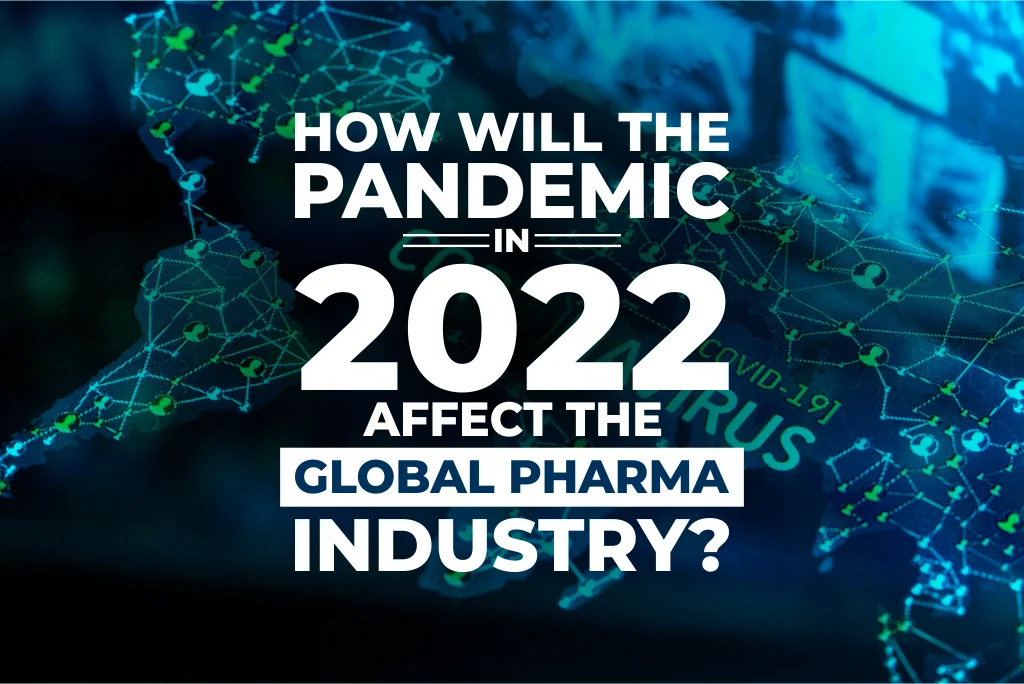
The Global Pharma Industry has been on the frontline to fight against the pandemic with the healthcare providers. Consequently, pharmaceutical companies across the globe have witnessed changes faster than a roller coaster ride in the past few years. New research and development of vaccines and medicines to decrease the effect of the virus are abundant in many companies.
As a result, pharmaceutical sales in the 60 biggest markets worldwide are expected to increase by 4.6% in US-dollar terms to about US$1.5trn. The growth is faster than most of the records of the previous decade. Despite the economic slowdown of the countries, the rise of sales in the pharmaceutical sector is remarkable. Before going further on how pandemic in 2022 will affect the Global Pharma industry, let us go through the history and origin of the covid virus.

History, consequences of the pandemic on the pharmaceutical industry in past years
Coronavirus Disease of 2019 (COVID-19) refers to an infectious respiratory ailment brought about by a strain of coronavirus first discovered in December 2019. Having originated from Wuhan, China, the disease has spread to virtually every country worldwide. As a result, the novel coronavirus disease 2019 (COVID-19) was characterized as a global pandemic by the WHO on March 11, 2020.
Globally, there have been 270,031,622 confirmed cases of COVID-19, including 5,310,502 deaths, reported to WHO recently. These numbers are getting updated daily on the WHO coronavirus dashboard. This pandemic had revolutionary effects on the health market and the pharmaceutical sector. The consequences of the pandemic are cited below:
- Increased demands of drugs for chronic disease
- Revisions of regulations
- A shift towards self-reliance of products for manufacturing
- Delays of approval of filed products
- An industrial slowdown of non-covid drugs
- Transformations in the supply chain due to disruptions
- Changing trends in the consumption of the health market
- Development of vaccines and medicines for the treatment of the virus

Vaccine distribution and its efficacy
Innovation has been a significant drive in the pharmaceutical industry for years. For example, the industry worked vigorously towards developing vaccines to prevent the coronavirus and produced it in a record time of fewer than 12 months.
As per the latest reports, 56.4% of the world population has received at least one dose of a COVID-19 vaccine. Yet, only 7.3% of people in low-income countries have received at least one dose. Moreover, according to WHO, as of December 12, 2021, about 8,200,642,671 vaccine doses have been administered.
With the new mutations and variants of coronavirus, such as delta and omicron variants, scientists across the globe are doing extensive research on the effectiveness of the different COVID-19 vaccines. High immunization through vaccines can not wholly prevent the variants of the virus but provide different levels of protection to infection, mild disease, severe disease, hospitalization, and death.
We have to keep in mind that no vaccine is 100% effective. WHO authorized vaccines only reduce your risk of developing severe illness and death. The details on frequently asked questions related to vaccines are available on the website of WHO.
Accelerated R&D approach and clinical trials
Pandemic has stimulated the process of research and development in the pharma companies. For example, the first antiviral oral medicine, Molnupiravir, developed by Merck and Ridgeback, has received approval from MHRA (U.K.) and is under evaluation by FDA. Merck expects to produce 10 million courses by the end of 2021. Another drug Paxlovid from Pfizer is also a potential hope for the future. Pfizer plans to submit its trial data to the US FDA for emergency use authorization as soon as possible.
Digital data-driven research is the new key element currently. In addition, the pursuit of medication errors prevention and quality improvement has led to a growing interest in artificial intelligence (AI) and precision medicine.
Clinical trials were previously carried out on-site, but the lockdown has shifted this practice to speedy virtual trials. In addition, companies are taking a holistic approach to carrying out clinical trials safely and effectively. They are even using electronic tools and additional remote medical options in homes to monitor progress. The Remote clinical trials allow patients to participate without barriers to COVID-19 exposure.

What will be the New Normal?
The Covid-19 pandemic will not die but most likely fade away in 2022. After that, however, there will be occasional flare-ups in the countries where people are still under-vaccinated. Vaccine supply should also ease in 2022. Nevertheless, a small percentage of people will still get ill from COVID-19 even though they have been vaccinated. Hence, a new normal will be the post-pandemic normal with the cautions of masks and social distancing measures. The industry is entering 2022 in good shape with minor criticism, more central to government policy, and less budget pressure than in recent years.
Conclusion:
Regardless of the hindrances caused by the pandemic, the coming year will see an increased focus on new medicines, vaccines, and treatments. Furthermore, digital health care will gain more popularity, and healthcare costs will rise.
For more such insights, stay tuned to our website https://newedgeoverseas.com/.